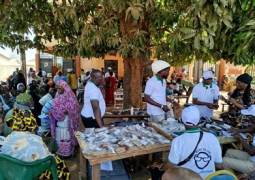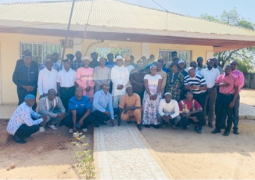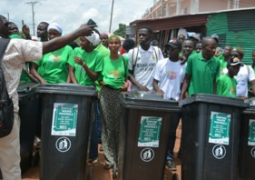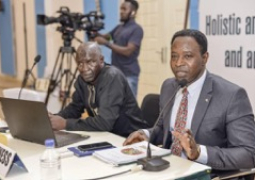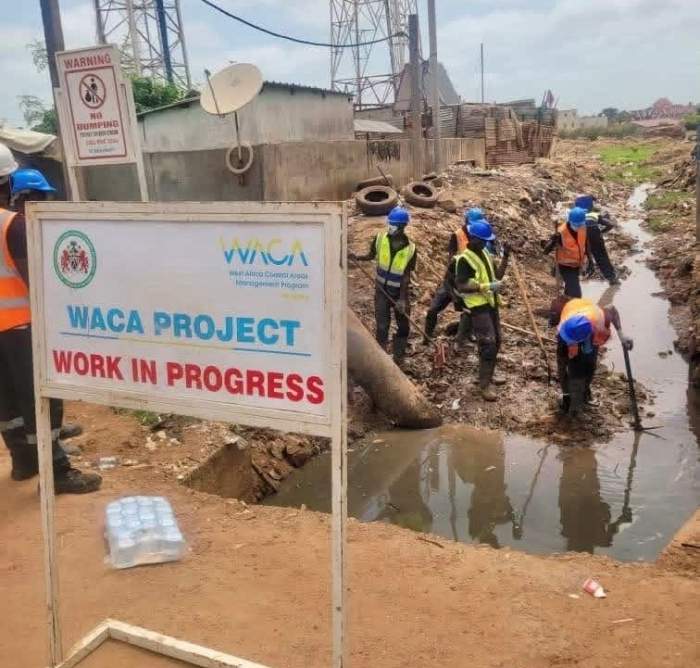
Most of the residents interviewed admitted that they do not fully understand the long-term environmental consequences of throwing waste into the waterway. However, for some their concerns are immediate; how to avoid foul smells, flies and pests that pile up when waste remains too long in their compounds.
With collection trucks arriving unpredictably and bins often overflowing, they said they feel pressured to dispose of waste anywhere possible, which frequently ends up being in the stream or its banks.
“We don’t like throwing waste in the stream, but what do we do when the trucks delay for days?” said Mariama Jallow, who has lived beside the canal for nearly two decades.
“We were never taught how this can affect the environment. Some say it causes flooding, but most of us have never been explained how.”
Her frustration reflects a wider gap between community realities and the environmental messaging meant to guide them.
Another resident, Pa Modou Sey, shared the same worries. He said sensitisation programmes rarely reach ordinary households, even though they are the ones most affected by the pollution.
“We hold workshops, but it’s the same group of people they invite every time. Many of us never hear anything. If they want us to understand, they should come to our doors and talk to us in the languages we use every day.”
A few residents said they had attended small trainings about recycling or waste management, but that admitted that they still do not grasp the link between improper waste disposal, flooding and pollution that follow.
For them they are of the view that environmental authorities need to adopt more direct, practical and regular forms of sensitisation.
“We want to do what is right, but nobody comes to tell us how. If they talk to us regularly, we will change,” said resident Binta Bah.
Mr Abdoulie Sey, Communication Specialist for WACA, shared that community awareness sits at the centre of the West Africa Coastal Areas (WACA) project’s efforts to restore the Kotu Stream.
He revealed that communities were not only involved in designing the project, but continue to play a crucial role in its implementation.
Through regular engagement with ward Councillors, Alkalolu, VDCs, youth and women leaders, WACA works to equip residents with the requisite knowledge on disaster risks, waste management, emergency preparedness and early warning, so that they can stay safe and protect their environment.
Thus, Sey maintained that WACA’s awareness interventions are extensive, ranging from door-to-door sensitisation to community meetings, school outreach, and nationwide broadcast campaigns.
Volunteers have reached more than 24,000 people in ten days this year alone excluding thousands reached on radio, TV and social media.
Yet, despite growing awareness, the problem of waste persists. In view of its complex nature, it cannot be solved through sensitisation alone.
Some residents still dump waste and even discharge sewage into the stream, highlighting the need for stronger enforcement and improved waste collection support, which he said, WACA is now addressing in partnership with NEA, KMC and BAC.
To deepen public engagement, Sey reveals that WACA is creating a community youth action group and expanding school-based environmental programs.
While acknowledging that sensitisation has significantly improved knowledge and disaster preparedness among stream communities, he maintains that long-term change requires behavioural shifts supported by enforcement.
His key message in protecting the Kotu Stream is not just an environmental duty, but rather a matter of saving lives, especially with the stream’s dangerous flooding history.
Bakary B. Darboe, an official from Kanifing Municipal Council (KMC), and responsible for waste collection in the area, shared that council operates weekly collection routes, but the challenge goes far beyond trucks and bins.
As Waste Manager under the Mbalit Project, Darboe noted that
many improper disposal habits persist because people lack basic understanding of the environmental consequences.
“Awareness is one of the weakest points. We need more education, especially door-to-door sensitization. People must understand that when they dump in the stream, they are suffocating their own community.”
Darboe, however, acknowledged that WACA in collaboration with KMC, has made considerable efforts to improve waste management in the area.
Moreover, he noted that problem persists as people’s behavioural issues remains unchanged.
The council, he added, would continue to strengthen its systems, adding that no infrastructure will be effective without consistent, wide-reaching public education.
“People need to be educated regularly for any waste management system to work.” he said.
Meanwhile, environmental groups say the situation of Kotu Stream reflects a national pattern.
Muhammed Hydara, Secretary General of the Gambia Environmental Alliance (GEA), said awareness is the foundation of environmental behaviour and without it, no policy or technical intervention can succeed.
He explained that real change happens only when people understand why their individual actions matter and how their habits directly affect their community’s health and safety.
According to him, sensitisation in communities like Kotu must be local, practical and rooted in familiar languages and cultural platforms.
He said the most effective channels include mosques, churches, markets, youth groups, local radio and door-to-door visits, methods that speak directly to people in their daily lives.
“Awareness is not a one-time event,” he said. “You cannot teach people once and expect permanent change. It must be continuous, repeated and connected to their daily lives.”
Hydara thus noted that as long as sensitisation remains weak, waste dumping habits will continue despite the presence of bins, trucks and drains.
He said behavioural change requires convenience, community pressure and constant reinforcement, while highlighting the role of media, storytelling and real-life examples to help people emotionally connect to environmental issues.
“The waste people throw away today will return to them tomorrow, it will come back through flooding, pollution or the health of their children.”


